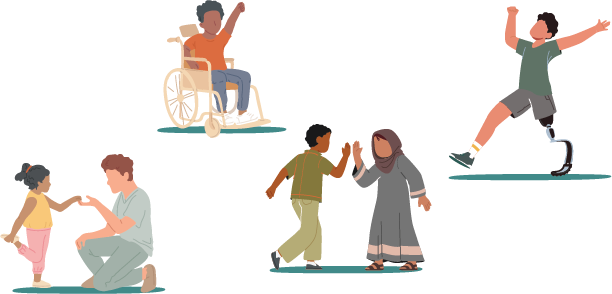August 5, 2024: To support increased collaboration between state Early Hearing Detection and Intervention (EHDI) programs and Individuals with Disabilities Education Act (IDEA) Part C early intervention programs, our HRSA EHDI program issued a joint letter with the CDC EHDI program and the Department of Education Office of Special Education Programs. Read the letter.
Latest news
We identify children who are deaf or hard of hearing (DHH) and get them the support they need. This helps them reach language and other developmental milestones.
Our goal
We want every family to get what their child needs so that they can play, go to school, and grow up to become a healthy adult. We want parents and siblings to thrive too.

Why are these milestones important?
Language milestones serve as benchmarks. They help us monitor and evaluate how a child develops. Children who are deaf or hard of hearing often need help reaching these milestones. By tailoring support and intervening when needed, we can help them gain strong language skills.
What contributes to better functioning systems for DHH children?
We help states, territories, families, and providers to develop coordinated systems of care.
We improve public health systems by:
- Increasing the number of health care providers qualified to carry out the work.
- Making sure families have access to information that is accurate, comprehensive, up-to-date, and evidence-based to allow families to make important decisions for their children in a timely manner, including decisions with respect to the full range of assistive hearing technologies and communication modalities.
- Creating and fostering support systems for these families. These include programs where:
- Families help other families, known as “family-to-family” support
- DHH adults help families to navigate the system, known as “consumer-to-family” support.
What parts make up a state and territory EHDI system?
- Screening
- Diagnosis
- Family support
- Medical home (coordinated services across various clinical and social settings)
- Early interventions
Why is it crucial that the system functions well?
Children have a greater chance to meet their language milestones.
What needs to happen by age?
| Age | Step |
|---|---|
| 1 month old | Screen |
| 3 months old | Diagnose as deaf or hard of hearing (DHH) |
| 6 months old | Enroll in early intervention |
| Ongoing | Provide access to services, including family support |
What have we achieved so far?
Before 1993, healthcare professionals screened fewer than 1 in 10 newborns in the US for hearing loss. Now they screen more than 98% of all newborns.
How has this screening helped?
This recent study found that in the years since universal newborn hearing and early hearing screening detection and intervention started, DHH children in one school district demonstrated progressively better outcomes in reading proficiency:
Which groups improve the EHDI systems?
- State and territory health departments
- Academic institutions
- Non-profits
- Health and social service professionals
- Family-based groups
Which projects contribute to system improvements?
We award grants to 59 U.S. states and territories who improve the system through:
- Making routine early and regular screening, diagnosis, and intervention
- Training health professionals
- Engaging, partnering, and supporting families
Access the fiscal year 2024 awards charts to find the organizations and amounts awarded.
The EHDI National Network Centers provide support at the national, state, territory, and local levels.
The centers are:
- The Implementation and Change Center (ICC)
The ICC helps state and territory EHDI programs put into practice the best science to help DHH children and families get the services they need to meet language milestones. A cooperative agreement with the Beacon Center at Gallaudet University supports the ICC. - Family Leadership in Language and Learning Center (FL3)
The FL3 works to strengthen family engagement, leadership and family support across EHDI systems. A cooperative agreement with Hands & Voices supports the FL3 Center. - Provider Education Center (PEC)
The PEC helps health care professionals who screen, diagnose and provide services to infants, children and families interacting with the EHDI system. A cooperative agreement with the American Academy of Pediatrics supports the PEC.
The Leadership Education in Neurodevelopmental and Related Disabilities (LEND) program trains future leaders in a variety of disciplines. This EHDI program supports LEND pediatric audiology trainees.
The LEND audiology program's goals are to:
- Strengthen the focus on screening, treatment, and follow-up in infants and young children who:
- Are deaf or hard of hearing
- Have autism spectrum disorder (ASD) or other related neurodevelopmental disabilities (DD)
- Increase the number of pediatric audiologists with clinical expertise and leadership skills who can deliver care to infants and young children with ASD or other DD.
- Enroll more infants and children with ASD or other DD who are deaf or hard of hearing into early intervention programs.
This program provided supplemental funding to 12 LEND programs to support training for pediatric audiologists.